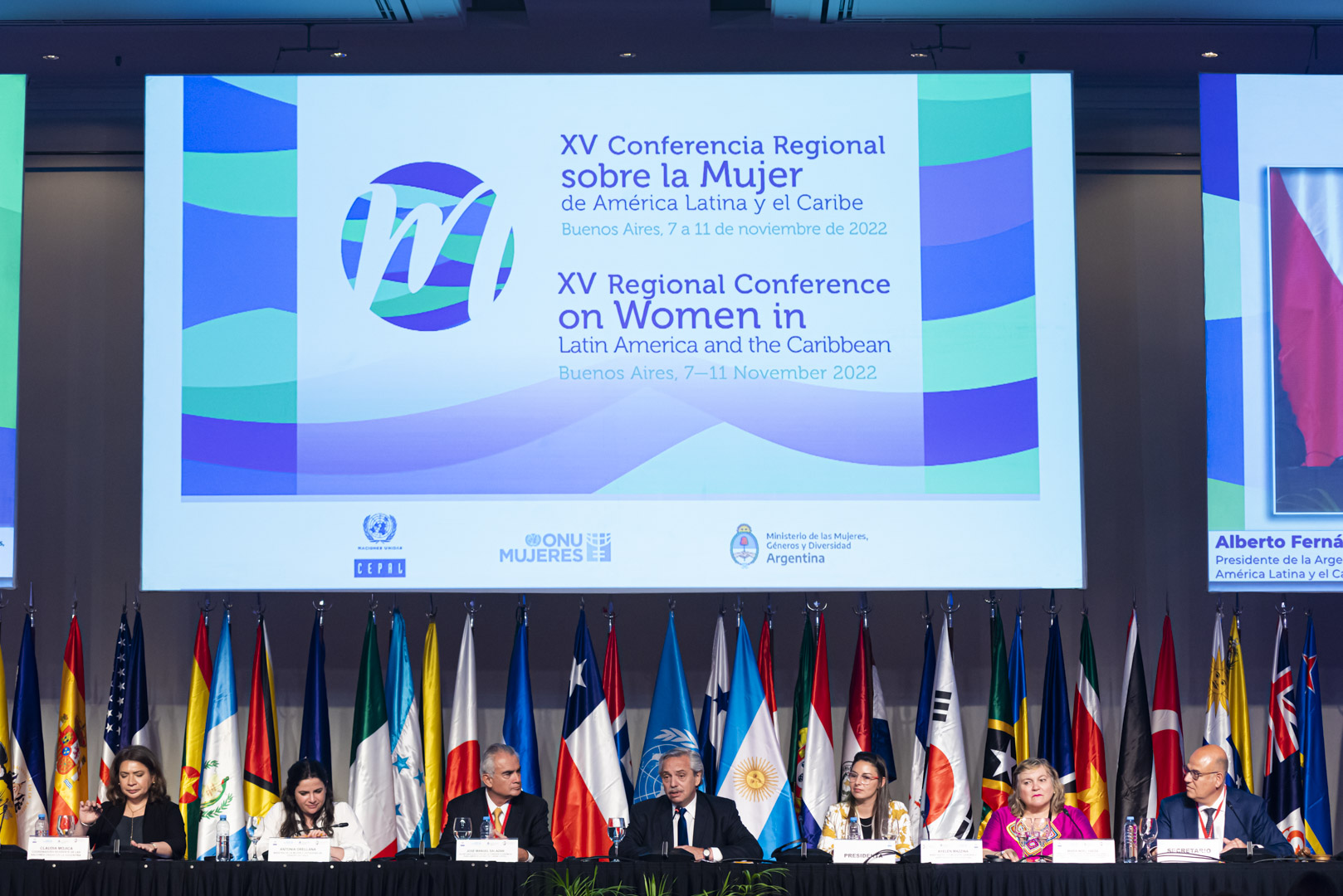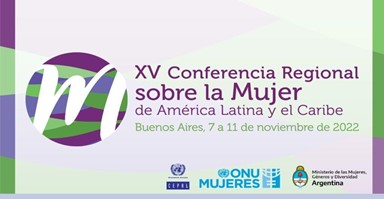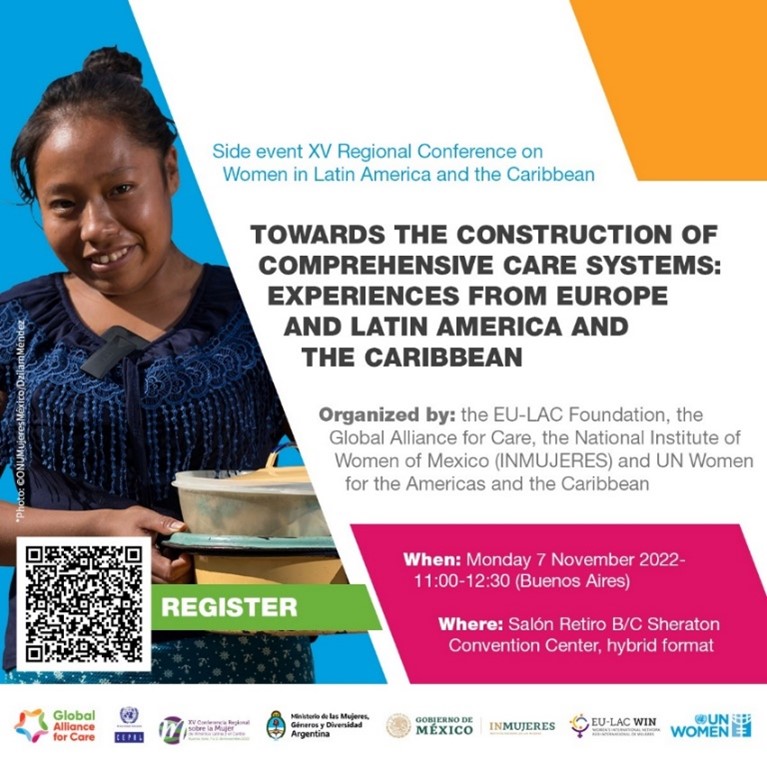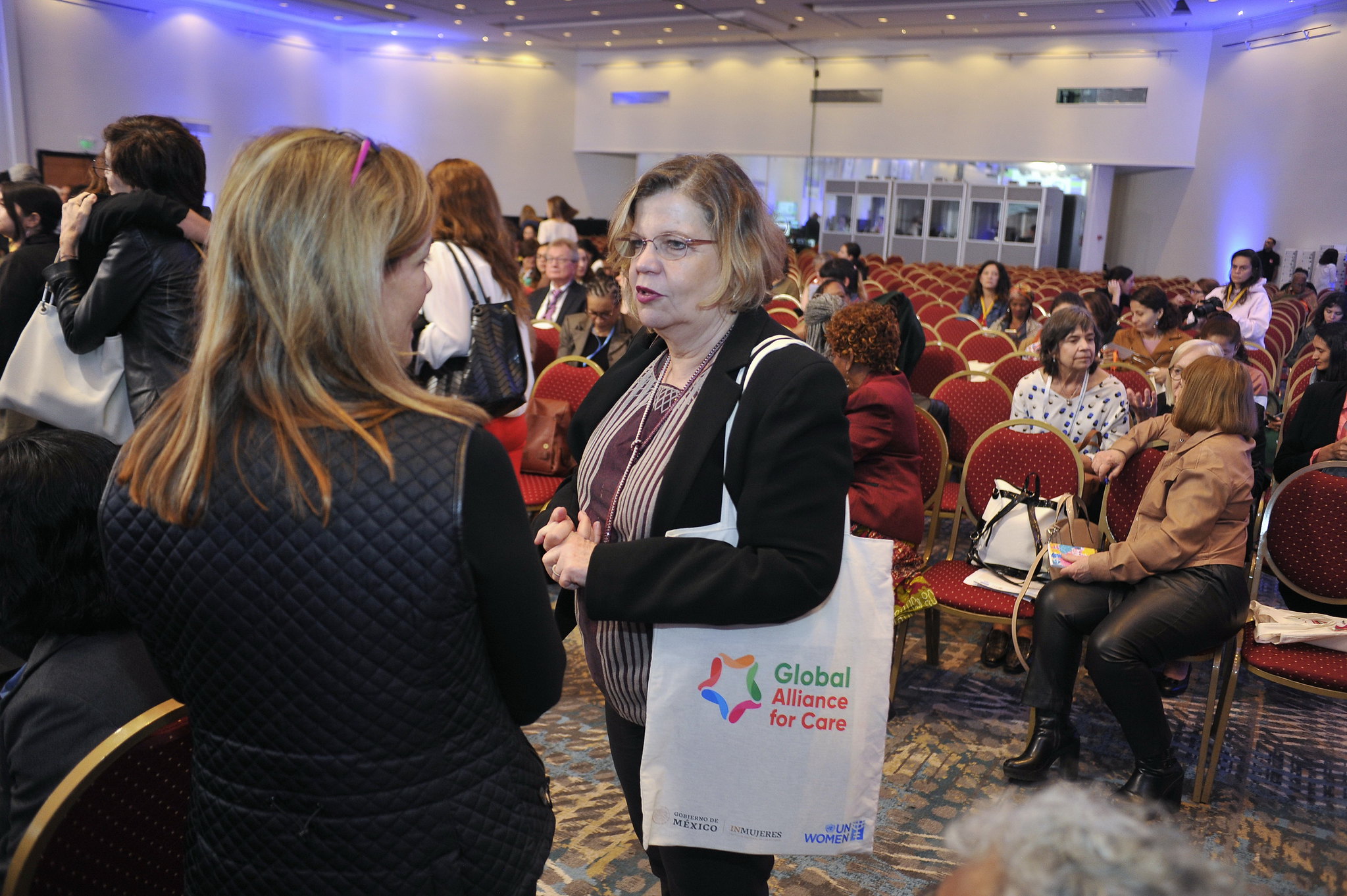
- The Alliance engaged with Ministers and stakeholders to push for a care society at the XV Meeting of the Regional Conference on Women in Latin America and the Caribbean
The Global Alliance for Care (GAC) took part of the the XV Meeting of the Regional Conference on Women in Latin America and the Caribbean, held in Buenos Aires, Argentina, from 7 to 11 November, to put the Care Society at the center of regional agreements and push forward with ministerial dialogues, where Ministers of Bolivia, Guatemala, Honduras, and Paraguay expressed interest in joining the Alliance's membership.
This Regional Conference focused on The Care Society as a Horizon for Sustainable Recovery with Gender Equality, and resulted in the Buenos Aires Commitment, an ambitious and forward-looking road map to moving towards a Care Society in Latin America and the Caribbean.
The Buenos Aires Commitment includes a formal recognition of the Global Alliance for Care "as a multi-stakeholder co-creative space in which governments, international organizations, civil society, academia, the private sector, philanthropic, trade union and caregiver organizations, and national, regional and international youth and feminist networks exchange experiences and good practices to advance the right to care agenda at the global level, recognizing that some countries in the region are part of the Alliance and inviting other countries to join this initiative" (paragraph 49).
Through four side events convened and co-convened with members of the Global Alliance for Care, a Working Breakfast with Ministers and high authorities of the National Mechanisms for the Advancement of Women of Latin America and the Caribbean, bilateral meetings, and dialogues with Member States and stakeholders, the Alliance actively promoted the exchange of experiences and their engagement in a collective effort towards advancing to a caring society and achieving a transformative and sustainable recovery with gender equality in Latin America and the Caribbean.
The Global Alliance for Care is a global multi-stakeholder initiative launched by the National Institute of Women in Mexico (INMUJERES) and UN Women in the context of the 2021 Generation Equality Forum. This Alliance is an urgent call to action within the broader framework of the Generation Equality Action Coalition on Economic Justice and Rights.

Learn more about the Global Alliance for Care here: https://alianzadecuidados.forogeneracionigualdad.mx/acerca/?lang=en
Read more to find out the highlights of the GAC events at the Regional Conference for Women in Latin America and the Caribbean
- "Towards the construction of comprehensive care systems: Experiences from Europe and Latin America and the Caribbean," co-organized with EU-LAC Foundation, INMUJERES, and UN Women on November 7. The event featured a ministerial dialogue on the challenges, gaps, lessons learned, and opportunities to strengthen cooperation between the European Union, Latin America, and Caribbean countries. Bilateral collaboration was recognized as critical in strengthening the needed inter-institutional articulation to protect the rights of those who receive and provide care. Panelists highlighted the responsibility of the legislative and executive branches in advancing the care agenda. Participants stressed that it is critical to place care work at the center of the multilateral agenda to ensure accelerated action toward a. recognizing care as a human right, a public good, and an essential work for maintaining life and economic growth; b. forging collective action and co-responsibility in care work, promoting the creation of decent jobs and dignified and safe work environments for caregivers, and c. generating political commitment and financing for the progressive and sustainable construction of comprehensive care systems.

- "Care in Latin America: multi-stakeholder strategies and experiences for advancing an equality agenda," jointly organized by the Latin American Justice and Gender Team (ELA), INMUJERES, and UN Women on November 8. Participants stressed the unequal distribution of care work as the underlying cause of gender inequality. They reflected on the importance of promoting care as a right and the intersectional approach in the construction of comprehensive care systems that, over the principle of social co-responsibility on care, secure public policies that protect the rights of those who receive and provide care and the hard-won wins on gender equality. Natalia Gherardi, Director ELA Team, stressed the need to strengthen the legal obligations that states have assumed and turn them into political policies to advance gender equality. "We must strengthen the gender institutions we have worked hard to build and sustain. The trivialization of the feminist agenda is dangerous," she said. Facundo Chavez Perilla, Human Rights and Disability Adviser from the Office of the High Commissioner of Human Rights (OHCHR), highlighted that "we need to think the support and care agenda of the future, people-centered, for gender-equality and disability inclusion." In remarks, Belen Sanz, UN Women Representative in Mexico, "reiterated UN Women's commitment as co-convener of the Global Alliance for Care and to continue strengthening this platform that promotes an inclusive and transformative care economy."

Nadine Gasman, President of Mexico's National Institute for Women (INMUJERES), at the XV Regional Conference on Women of Latin America and the Caribbean. Buenos Aires, Argentina, 7 to 11 November 2022. Photo: ECLAC
- "Supporting the Global Alliance for Care by providing Data. Research and Evidence for Policies in Latin America and the Caribbean" convened on 9 November by the United Nations Research Institute for Social Development (UNRISD), INMUJERES and UN Women. UNRISD, a member of the Global Alliance for Care, presented a digital platform sponsored by IDRC that will be developed in support of the Alliance and that will serve as a repository of research and evidence about care work in Latin America and the Global South' countries and from a diversity of stakeholders, for members of the Alliance to share, learn and advance in their commitments towards designing and implementing care policies and services. Marta Ferreyra, Director General of the National Policy for Equality and Women's Rights from INMUJERES Mexico, mentioned that "The creation of this global digital community will allow the exchange of information and experiences, so it will be necessary that users take ownership of the platform and use it to generate visibility of the care agenda at a global level, for the benefit of caregivers." The project will also develop a global Rapid Research and Evidence Facility for Care to mobilize partnerships and collaboration with regional, national and local research institutions and produce research on care topics. In her closing remarks, Belen Sanz, UN Women Representative in Mexico, invited partners to join the Global Alliance for Care and to continue building solutions collectively to place care at the center of the agenda for achieving equality.
- "Care at the center: Domestic workers' access to social security. Progress and Challenges in Latin America", held on 10 November by the Global Alliance for Care, the National Institute of Women of Mexico (INMUJERES), the International Labour Organization (ILO), the Ibero-American Social Security Organization (OISS), and UN Women. The event featured the presentation of the ILO, OISS, and UN Women report entitled "Care at the centre: Domestic workers' access to social security. Progress and Challenges in Latin America." Although 15 countries in the region have ratified ILO Convention 189, inequalities persist in labor legislation and domestic employment remains predominantly under precarious conditions without access to social security. "These inequalities also occur in social security systems that exclude benefits that other workers have, such as maternity, unemployment, or protection against occupational risks," explained Flavia Marco, director of the study. Panelists included trade unions, associations, domestic work federations in the region, international organizations, and government authorities. Nadine Gasman, President of the Women's Institute of Mexico, mentioned that it is imperative to take the care agenda to the highest level and that, at the regional and global level, synergies continue to be generated, taking advantage of collective efforts such as the Global Alliance for Care. The panelists also welcomed the study and the progress achieved ten years after adopting the ILO Domestic Workers Convention (189) in 2011. They stressed the persistent challenges and barriers domestic workers face to exercise the universal right to social protection and shared important recommendations towards securing increased funding for comprehensive care systems, which would lead to creating up to 1.8 million domestic care jobs by 2030, extending the labor rights and protection to all domestic workers, within the cycle of work and after retirement. The session stressed civil society, women's movements, and unions have played a fundamental role in promoting the labor rights of care workers and strengthening grassroots women's organizations.
- In addition, the GAC participated in the side event "Multilateral Approach to the Care Economy: Connecting UN Reform with the Regulatory, Legal and Policy Changes Needed to Transform the Care Sector," convened on November 7 by GWL Voices for Change and Inclusion, Women in Global Health, the National Institute of Women of Mexico, the Government of Colombia and UN Women. The event focused on global governance arrangements and the political guidance needed to ensure that a gender-sensitive agenda and women's rights are at the center of much-needed structural and political transformations in the multilateral system and the United Nations at the global level. Ximena Mariscal, Coordinator of International Affairs of INMUJERES, expressed her firm belief in the capacity of multilateralism to modernize its methods and constitute mechanisms that will help us move towards a caring society and achieve the goals that we have all set for ourselves in compliance with the 2030 Agenda, which is the most promising result of what multilateralism can achieve. She also stated that the Global Alliance for Care is a good example of the new ways of forging multilateral policies in this context.
